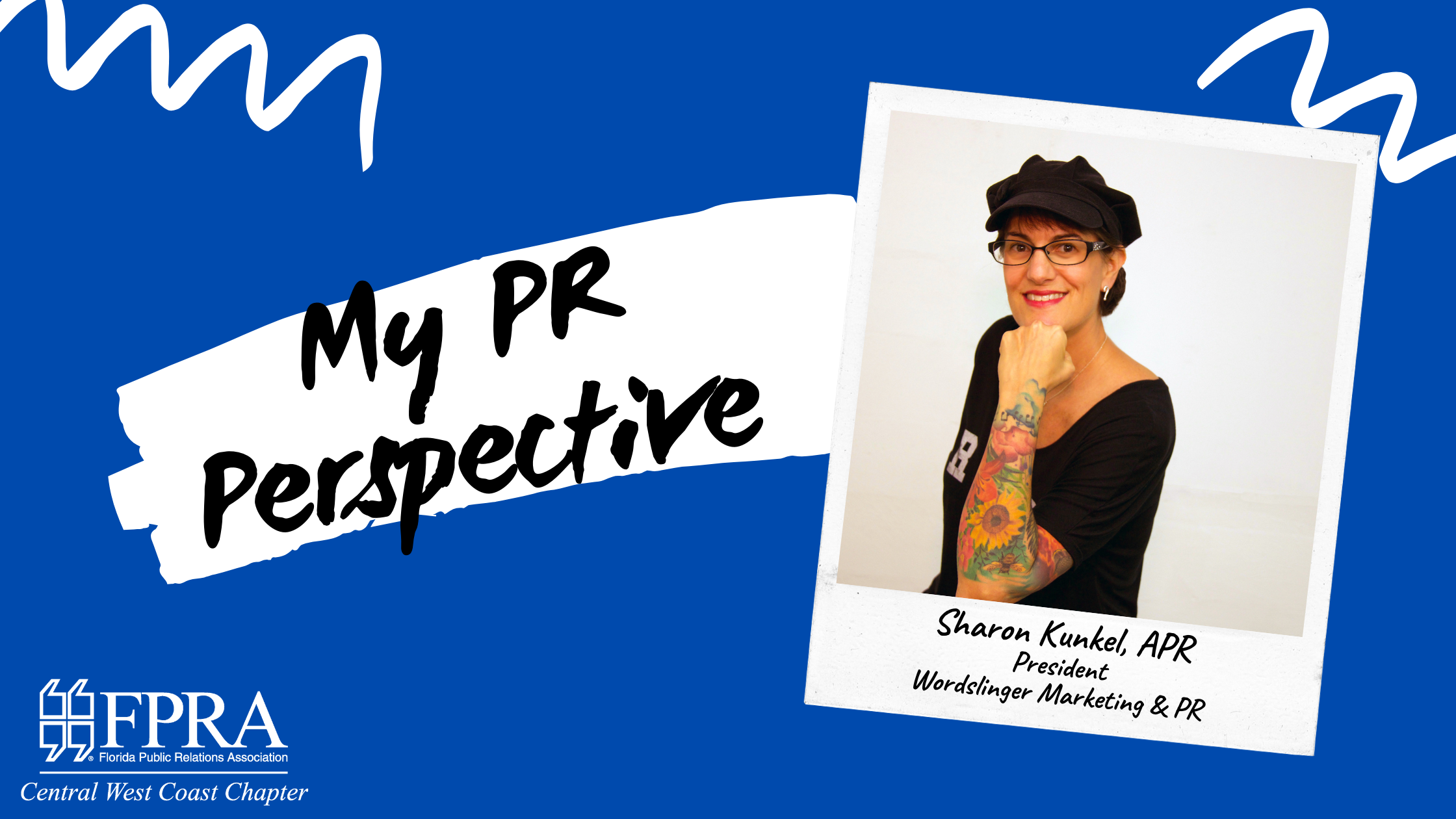
“My PR Perspective” is a series of blog posts where we ask our chapter members to give us their different perspectives of the PR profession.
Name: Sharon Kunkel, APR
What is your job title?
President, Wordslinger Marketing & PR. I launched my firm in May of 2014.
In a few sentences, describe what you do.
That might be difficult – as a sole proprietor working with numerous types of clients, there is little in the marketing/public relations realms that I don’t do! I work primarily with nonprofits, assisting with: overall strategy; writing/editing; media outreach; organizational, programmatic and event promotions; and video copywriting and direction. I also have guided crisis communications efforts, spearheaded rebranding campaigns, and assisted in the execution of capital and fundraising campaigns. I manage social media accounts for a few clients. I can also pitch in with event coordination, photography, website updates or (almost) whatever else a client may need.
So you can’t quite call me the “chief cook and bottle washer” … But if someone requested that I summarize what I do in one sentence, I’d say that I work to help organizations and businesses tell their stories in order to raise awareness and gain public support or customers for their services or products.
How did you get to this point in your career?
While I didn’t major in public relations in college, my major was writing intensive. It prepared me to be able to research and write about nearly any topic, which has been essential in my line of work as I tackle industries ranging from the arts, social services and education to solar energy, wealth management and insurance.
In the 1990s, I was a journalist and editor for various publications, which enabled me to understand very well what the media is looking for. Then I moved to nonprofit work from 2001-2014, which exposed me to a wide range of social issues as well helped me forge connections throughout the community.
I’d also like to mention that building my business has only been possible because of the relationships I’ve developed. Not every job has ended like a fairy tale – but I’ve NEVER burned a bridge. I’ve always done my best to offer something of value to my media contacts and kept in mind that there are real people on the other end of my emails and calls (and I always thank them when they’ve featured client news). If a person or organization needs a little advice or a referral, the answer is never a flat “no can do.”
In this line of work, you must be meticulous, available nearly 24/7, continuously learning, and kind. I always strive to be and do all of those.
Do you tell people you work in ‘PR?’ Why or why not?
Absolutely – I’m VERY proud of the work I do! If I’m speaking with someone who clearly has the wrong idea about our line of work, I’m happy to offer my own perception of the field as well as concrete examples of how my efforts have helped organizations and people within our community.
How would you describe an average public relations job?
I’m not sure what an “average” public relations job might be but, then again, “average” is never my goal! Public relations will generally have to do with maintaining a business or organization’s public image through means such as media outreach, content creation, public appearances, community relations and social media as well as crisis and reputation management. But the actual tasks you may perform in a public relations position vary widely, depending on experience and skill level as well as the value and trust an organization has for the practice of PR itself.
How is what you do different?
I believe what distinguishes my work is that I’m proudly hyper-local and I personalize every pitch. I don’t do much outreach via large distribution lists – I contact individual news directors, editors and reporters. I never fail to really listen to my clients so that I truly understand what it is they hope to achieve. Regardless of my skills and experience, if I don’t take the time to hear and get to know my clients, there’s no way I can help them reach their goals (or modify their goals to be more realistic). And while I am primarily focused on nonprofit work, my clients work in diverse realms, so I feel fortunate to have plentiful opportunities to learn new things.
What do you wish more people inside your organization understood about what you do?
Since I’m pretty much a one-woman shop, I’ll redirect this question as it relates to my clients. I’ve been working with many of them for years so, at this point, I believe they understand what it is I’m trying to accomplish on their behalf. There are still times when I might have to explain why certain actions might not be in their best interests or why I wish to tackle something that they feel uncomfortable about.
The most important thing that clients often don’t know at the outset is that public relations isn’t a one-way street. I’m not just a conduit pumping information out into the community. If public relations is done right, at a high level, then a public relations program can also help businesses and organizations do better and be better for their team members, clients/customers AND communities. It’s an honor when a client allows you to serve in a counselor role, for the purpose of their continuous self-improvement.
What do you wish more people outside your organization understood about what you do?
If I had to pick one thing, it would be that this work is almost never easy. I’d love to say that my life is like that of Samantha Jones (of “Sex and the City”), with endless long lunches and shopping with my besties, fabulous events, and rubbing elbows with celebrities … but it’s not. It’s frequently tedious and often grueling. But it’s always worthwhile, especially if you try to leave everything on the field each and every day. And I feel as though I’m actually helping people on a daily basis.
How has CWC-FPRA been a positive part of your professional development?
The networking has been by far the most valuable part, for me. When you work for and by yourself, you really miss not only the camaraderie of being part of a team but also feedback and creative ideas from other trusted professionals. Whether you have a thorny issue, could use some guidance on strategy, or can’t find the right contact at a media outlet, your CWC peers will be there for you. Inspiration is key: I am constantly inspired by the energy, knowledge and passion of my FPRA peers. I’ve also received numerous referrals through my CWC network – it’s always an honor for someone to recognize your skills by recommending you for a project.
Finally, I think it’s fair to say that I would never have put in the time and effort to earn my Accreditation had I not been involved with CWC. First you covet someone else’s initials, then you learn about the process and consider the investment, then your peers provide unflagging support (i.e., hound you mercilessly) until you make it happen. I’ve got my Certification in my sights and pledge to pursue that fairly soon.
